Day of Action Step-By-Step Guide
Now that you have signed up to host a day of action, here is a detailed guide. In addition to the guide below, we have two organizers who can provide one-on-one coaching and support. Once you select your site and type of action, the organizers can provide additional information to assist with your planning. We will also invite you to online media workshops. (If you found this page and have not signed up yet, sign up now!)
1. SELECT A SITE, DATE, AND TIME
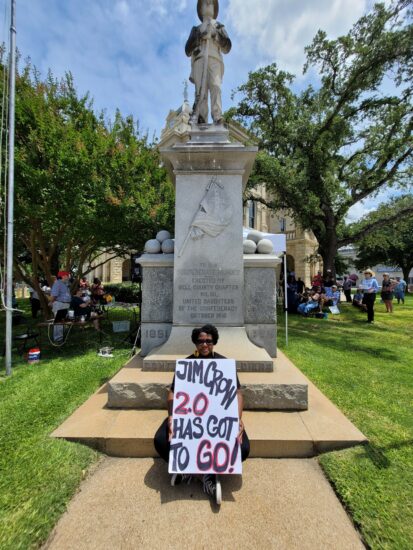
Belton, Texas. Photo by Richard Beaule.
Plan where to hold your event. It could be a virtual teach-in or town hall. If in person, select a site in your town or city that symbolizes or reflects history that teachers would be required to lie about or omit if these bills become law, which is already the case in some states. It could be identified by a historic marker, statue, archive, burial ground, or museum.
There are also countless historic sites that are unmarked — such as a freeway that destroyed a neighborhood or a university building funded by enslaved labor.
The power of selecting a historic site is that it becomes the focus of your media interviews, providing a concrete example of the history young people have a right to learn.
If in person, we encourage you to check on and be aware of any local guidance or ordinances on public gatherings in your area. And although outdoor gatherings are seen as safer, we recommend wearing masks and staying appropriately distanced to protect the health and well-being of all people in attendance.
Select any day or time from August 27 – 29. If that weekend does not work, pick another day. We are supporting and promoting #TeachTruth events throughout the summer and fall. If you are considering Saturday, August 28, we ask that you check the March on Voting Rights map. If there is a March On event in your city, reach out to collaborate or schedule the events at different times.
2. PLAN AN ACTIVITY
Organize an event with fellow educators, family members, students, and community members. The group can be any size. If you don’t have time to organize a group, pick a site and go on your own. Every action counts.
Determine type of action. There are a lot of options for organizing your event. Below are are some ideas from the June 12 events. For any events with speakers, it helps to have access to a microphone and amplifier so that everyone can hear.
Teachers read pledges and/or students testify at a historic site. There is power in having a group of teachers read their pledges aloud and students testify to why they want to learn history outside the textbook. Arrange to have one person as an MC who can create a list of the teachers who agree to read their pledges, introducing them one by one and keeping the program moving at a good place.
In preparation, ask teachers in advance to read their pledges and students to share why learning the truth about history is important to them. For example, in Washington, D.C., the group met at the African American Civil War Memorial and Museum. A third grade teacher was the MC and the museum director spoke and then teachers read their pledges. See photos and story about the D.C. event.
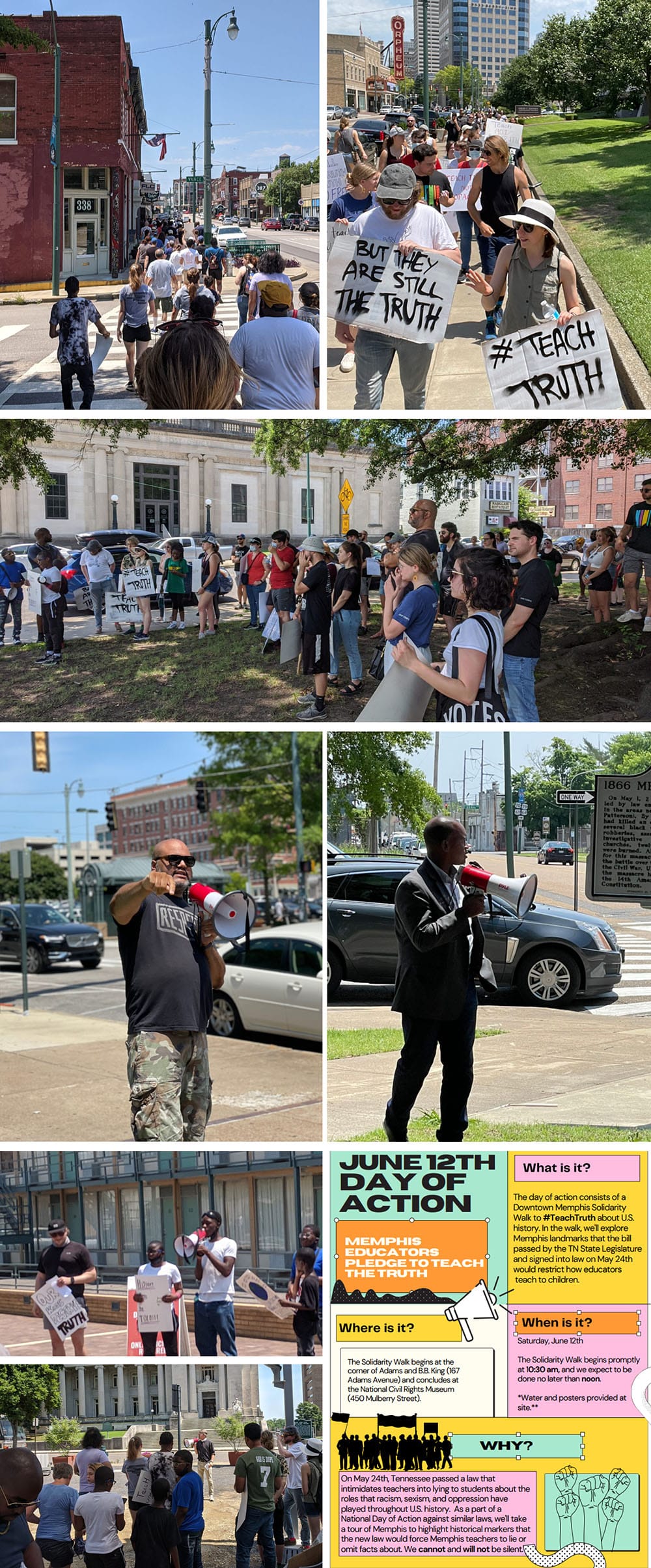
Walking tours. In addition to selecting a historic site for your convening, you can invite participants to walk or march to additional sites. Teachers in Memphis and Seattle organized walking tours, with different people responsible for sharing the history at each location. Here is the announcement for Memphis and here are photos of the event. In Waterloo, Iowa, speakers addressed the history of various sites that were in close proximity.
Rally with speakers. In addition to having teachers read pledges, you can invited noted guests to speak. Speakers could include historians, elected officials, poets, voting or climate justice activists, labor leaders, and more. We recommend encouraging speakers to keep their talks to five minutes or less. As an example, see the video from the June 12 event organized by Black Lives Matter Week of Action—Philly at The President’s House. If you are looking for speakers, here are sources:
-
-
- Historians for Peace and Democracy
- Civil Rights Movement Veterans
- Local voting rights and climate justice organizations
-
Books to symbolize banned history. As you plan your event, it is key to consider visuals that will convey the goals of your gathering to the public and the media. One suggestion is to have everyone bring a book that symbolizes the history they want to protect the right to teach about. For example, in Concord, New Hampshire, there was a book swap on June 12.
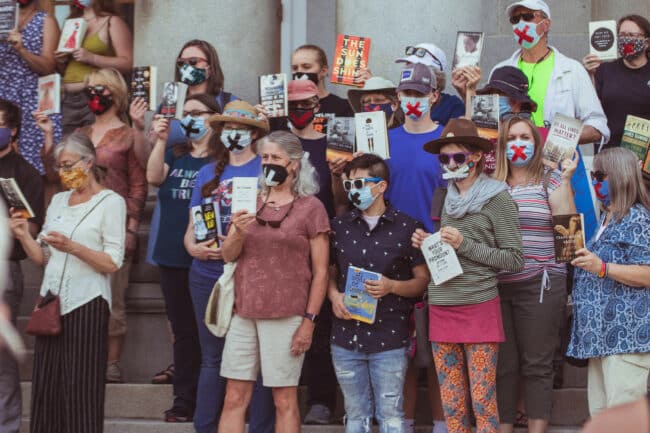
Educators rallied to pledge to teach the truth in Concord, New Hampshire. Photo by Troy Cromwell.
The Concord invitation said: “Participants are encouraged to bring a book that changed their perspective on systemic racism/inequity that might be considered “divisive” under the new law and treat the event as a giant book swap. Attendees will be welcomed to place their book on the capitol steps and at the end of the event, anyone who brings a book can pick a new one!”
Students as Historians. Students can be invited to share the local history of the respective site you select.
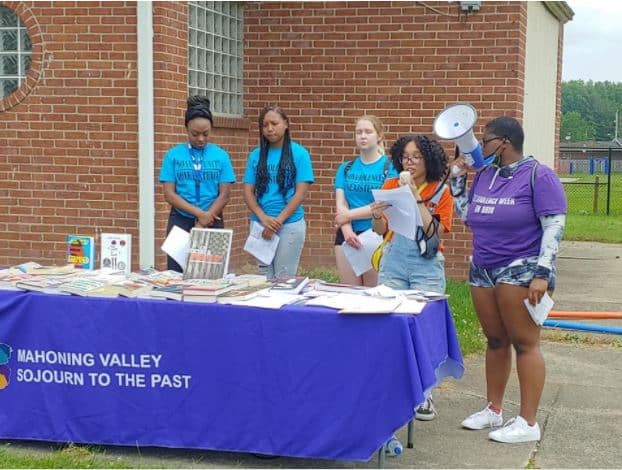
Sojourn to the Past students shared the Jim Crow history of swimming pools in Youngstown.
In Youngstown, students in a youth group shared the history of the local pool. (See photo above.) They also made the link to mass incarceration. A prisoner (speaking via cell phone and amplifier) addressed the group. Read the announcement.
Gather at History Sites Countywide. In Westchester County, an organizer got folks to pledge to #TeachTruth at sites throughout the county on July 22. See photos and read a detailed description of how the event was organized.
Virtual teach-in or town hall. The day of action event can be offered online as a teach-in with various presenters or a large group town hall. For example, the Foster Woods Folk School virtual teach-in on June 12 offered a series of five to seven minute “illegal lessons” from or about a historical site or event near them. Read the description of the sessions and watch the video. Black Lives Matter at School-Iowa hosted a town hall forum for educators, parents, and students to discuss the impact of the legislation and honor the stories and experiences of Black Iowans.
For more ideas, look at the list of actions from June 12th here.
3. SPREAD THE WORD
Create a Facebook event or webpage announcement. For Facebook, check out this example from Youngstown.
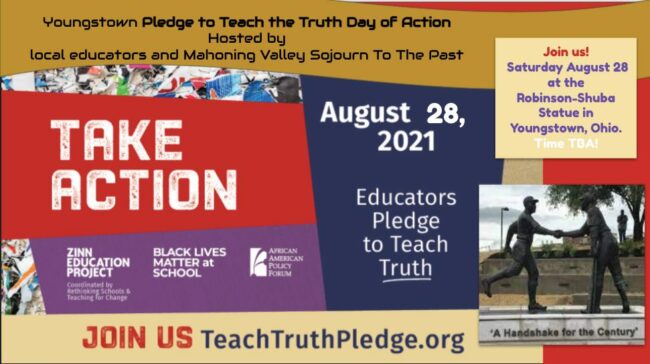
Send that link to the Zinn Education Project so that we can announce your event. We will add it to a page listing all the events nationally — and if you like — we can send an email to all the teachers on our list in your state or region. (We will send the email to you to check first to make sure all the information is correct.)
It will be on a page similar to this listing of June 12 events.
Create a graphic for your event. Templates and instructions can be found here.
On the announcement, include the hashtag #TeachTruth, a link to the national call to action, directions to the site, and remind participants to bring signs, a mask, and a water bottle. (We discourage the use of plastic water bottles, so encourage participants to bring reusable bottles.) Ask for volunteers to take photos and help with social media.
See the sample announcement to the right from Philadelphia.
If you prefer not to have your event listed, skip this step.
4. SECURE SPONSORS
Invite local organizations to endorse or join your action, such as the:
-
- state council for social studies
- teacher education programs at local universities
- teacher unions
- middle and high school student groups
- local poets, musicians, and artists
- voting rights organizations
- climate justice groups
- education advocacy groups
- community based civic organizations
- local elected officials
- religious leaders
- racial justice organizations
5. PREPARE MATERIALS FOR THE DAY OF ACTION
 Make signs or download them, when available, from this toolkit. You can make your own signs — here are dozens of ideas for language. Listen to sample chants.
Make signs or download them, when available, from this toolkit. You can make your own signs — here are dozens of ideas for language. Listen to sample chants.
Print handouts from the toolkit. These will be available for download by August 15.
Gather supplies you might need, such as tape, a trash bag, sign-up sheets, pens, and markers. Bring a few water bottles as backup in case people don’t bring their own.
6. GET IN THE NEWS
Make sure teachers voices are heard. We had a lot of success on June 12 with local and national media coverage. We have a media company working on contract to support your local organizing. They provide templates for media releases, feedback if requested on draft releases, and lists for local media outreach. In August, we will share the sample media releases and invite you to media training. Check out selected local coverage from June 12 in Portland, Waterloo, Youngstown, and Rhode Island.
The media announcements are sent two days in advance of the event and on the morning of the event.
7. OPTIONAL
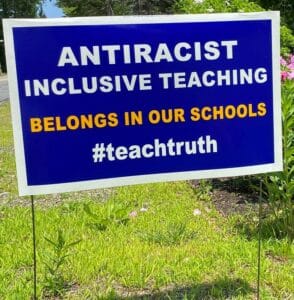 Have tables set up for postcard writing to legislators. A sample postcard is here. Have a list of legislators available to send postcards to. Link to current bills.
Have tables set up for postcard writing to legislators. A sample postcard is here. Have a list of legislators available to send postcards to. Link to current bills.
Have tables set up for social media posts with signs for people to hold. Graphics for signs and ideas for slogans and hashtags are here.
Order yard signs for participants to take home. Learn how.
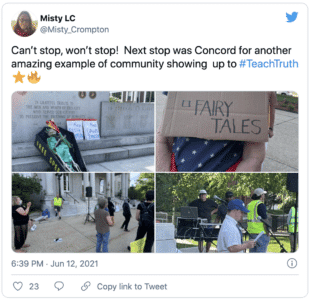 8. DURING THE EVENT
8. DURING THE EVENT
Post photos and videos to social media with the hashtag: #TeachTruth
Use these messages for people to post to social media during your event.
9. AFTER THE EVENT
Send pictures and descriptions from your event to the Zinn Education Project for posting online. Email to info@zinnedproject.org.
Take the time to congratulate yourself and your colleagues!
ASK FOR HELP
The #TeachTruth campaign organizers are Tamara Anderson and Debbie Wei. You have likely heard from one of them already. Please stay in touch, share updates, and ask for assistance. We want every site to be as successful as possible. If you have not been in contact with them yet, email info@zinnedproject.org. (If you have not signed up yet, sign up now!)

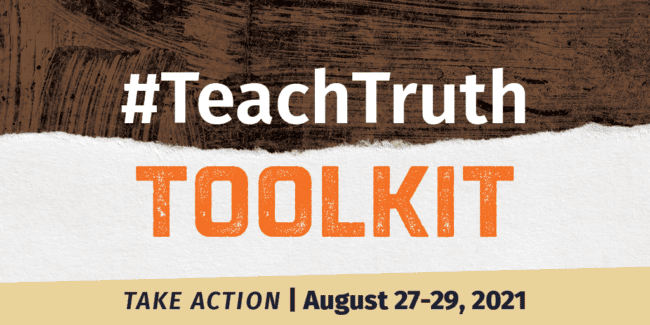
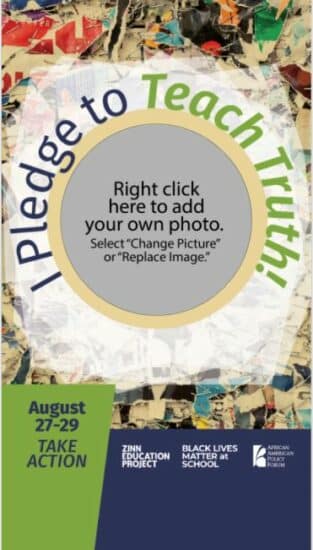
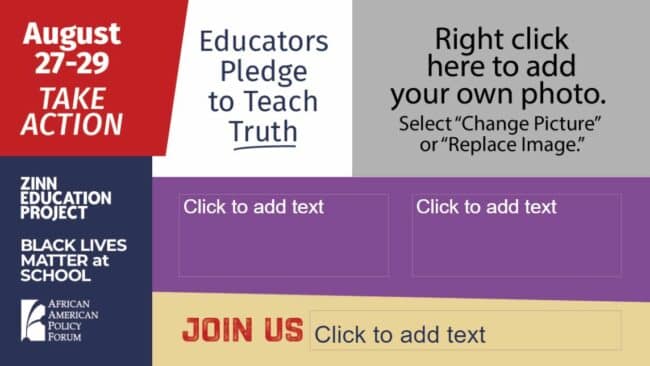

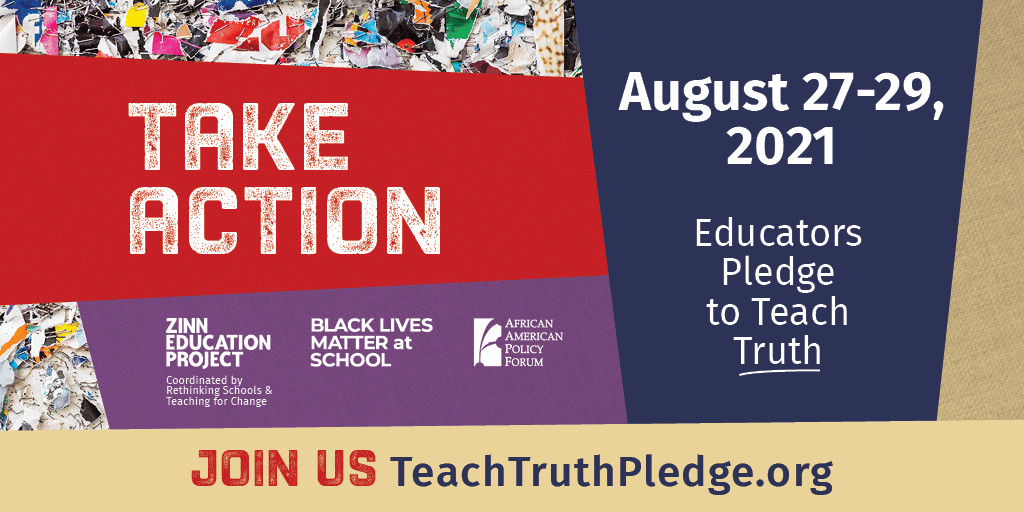
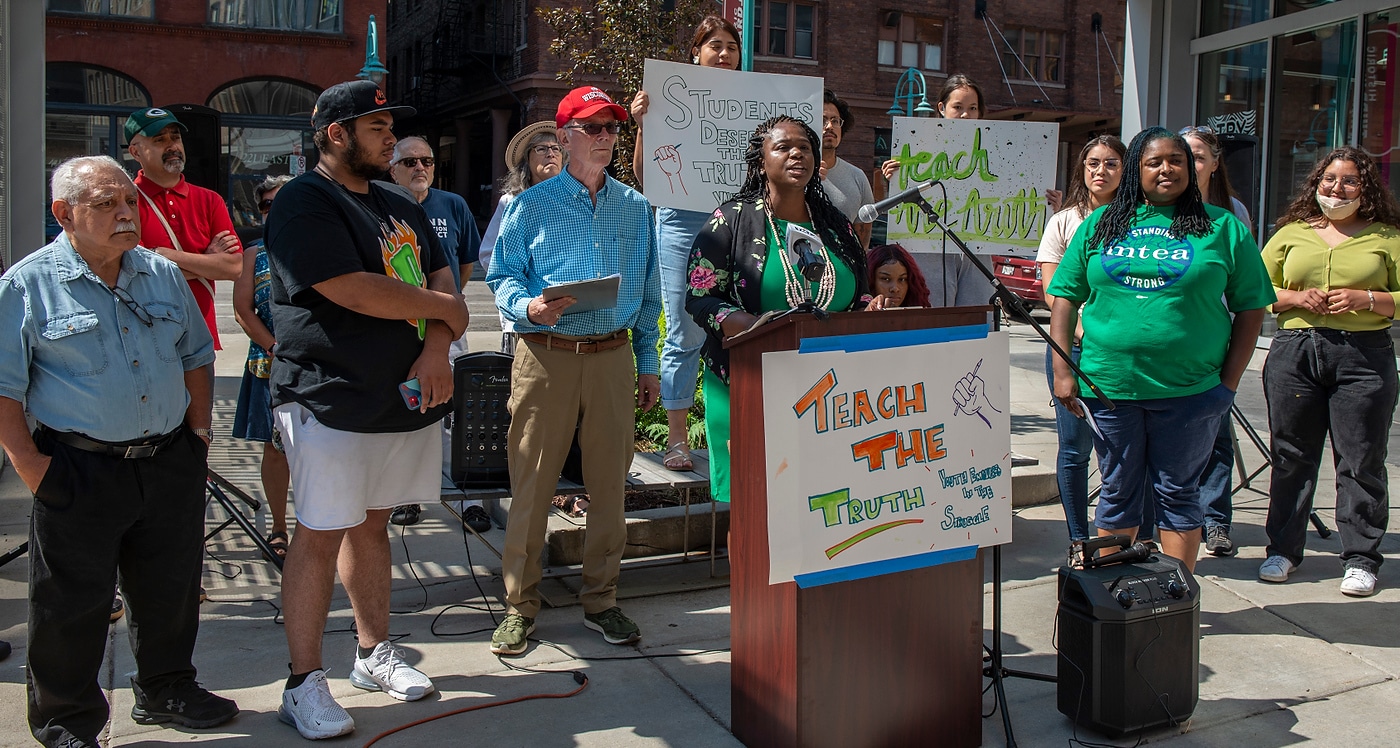
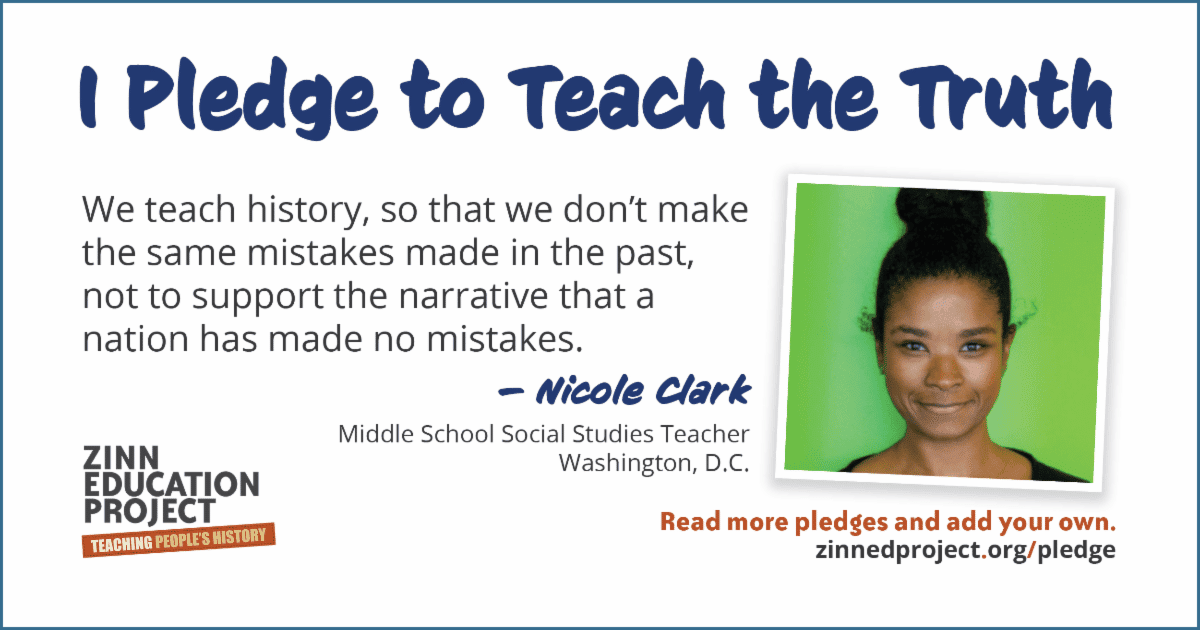





Twitter
Google plus
LinkedIn